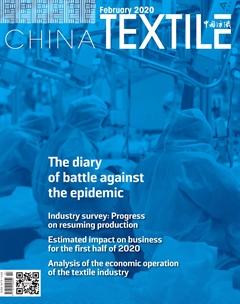China Textile City resumed business on February 18!
China Textile City market officially resumed business on February 18, and its business hours are tentatively scheduled from 10am to 4pm every day.
In 2019, China Textile Citys “online and offline” market turnover reached 252.689 billion yuan, with outstanding results. Affected by the COVID-19 epidemic, the China Textile City market was delayed for 18 days and resumed operations compared to previous years. In order to fully fight this epidemic prevention and control battle, major markets in China Textile City have formulated relevant protection programs.
It is reported that the current operating data of the online textile city has improved significantly compared with the same period of previous years. Especially for epidemic-related textile companies, a large amount of information on supply and demand for online has emerged. Since the epidemic, the “Online China Textile City” - QFC has added more than 1,898 merchants and 3,244 purchasers, distributed in 26 provinces and 16 countries and regions overseas. Since the resumption of business on February 10, the platform has received more than 15.8 million clicks, a yearon-year increase of 23%. Since the resumption of China Textile City, especially the QFC, on February 10, six overseas orders have been made, with an intentional turnover of USD 1.6 million. As of February 16, the average daily visit volume of the online textile city platform increased by 23% over the same period. During the period from February 10 to 16, the intentional transaction volume reached nearly 131 million yuan.
On February 17, in order to help enterprises effectively respond to the employment impact caused by the COVID-19 epidemic, and fully support the resumption of production, after research, Shaoxing launched eight policies: opening “employment buses” and giving enterprises chartered car subsidies, transportation subsidies for employees who come to Shaoxing, implementation of corporate recruitment rewards, implementation of “health code + white list” mechanism, overall solution to employeestransitional accommodation difficulties, support for enterprises to implement epidemic prevention measures, etc.
- China Textile的其它文章
- Dear readers
- The diary of battle against the epidemic
- Duan Xiaoping:Firm confidence,adapt to change,win in the future
- How is the progress of all industries in the second week of resumption of work?
- Industry survey:Progress on resuming production
- Survey on the work resumption of 4,650 enterprises in 19 clusters of cotton textile enterprises

